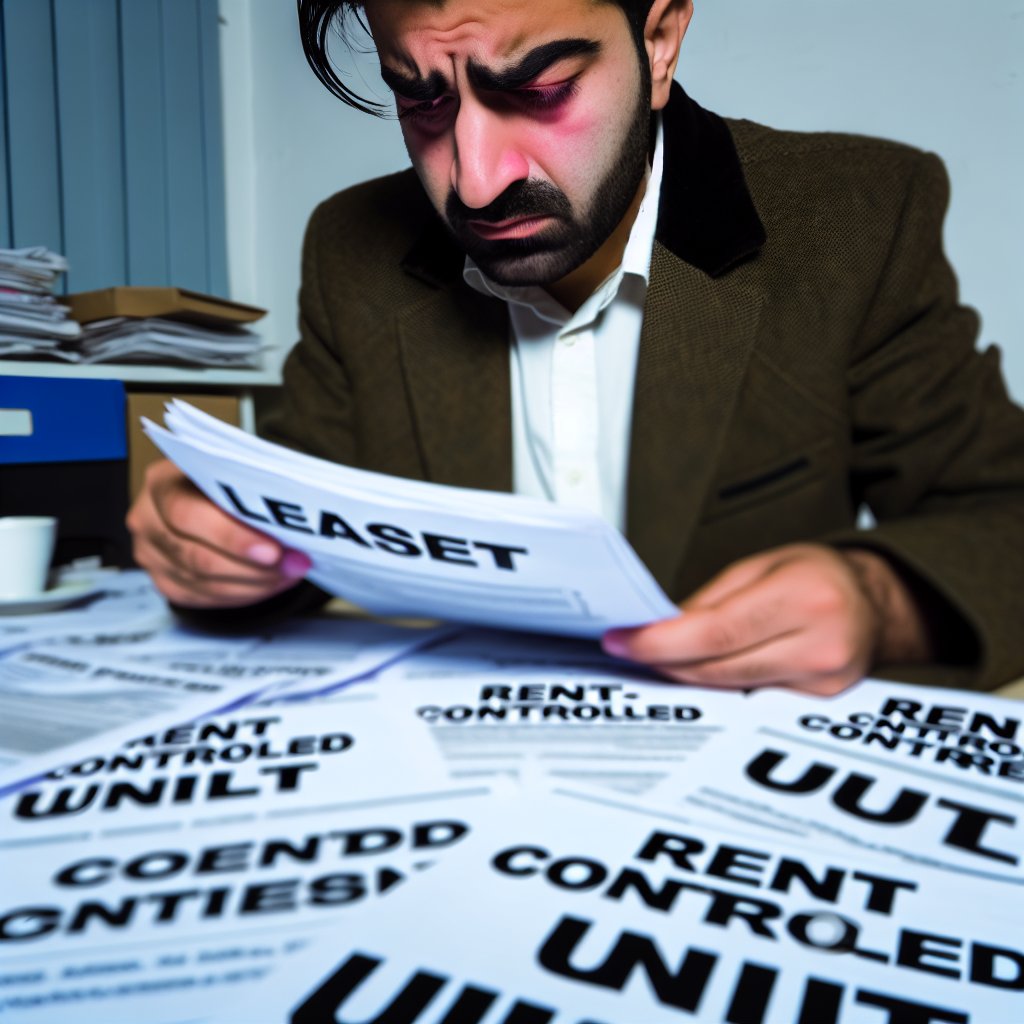Overview of Lease Agreements for Rent-Controlled Units
Understanding Rent Control
Rent control regulates the amount landlords can charge for housing.
This policy seeks to protect tenants from excessive rent increases.
Many cities have established rent control laws to support housing affordability.
Key Components of Lease Agreements
Lease agreements outline the terms between landlords and tenants.
The agreement specifies rent amount and payment due dates.
It also details the duration of the tenancy and renewal options.
Additionally, it includes rules related to property maintenance and repairs.
Rights and Obligations of Tenants
Tenants have the right to a safe and habitable living environment.
They must pay rent on time as agreed within the lease.
Moreover, tenants should notify landlords about necessary repairs promptly.
It’s crucial for tenants to understand their rights in rent-controlled apartments.
Rights and Obligations of Landlords
Landlords must provide a safe and livable space for their tenants.
They have the right to receive rent payments as specified in the lease.
Additionally, landlords need to respect tenants’ privacy and follow legal procedures.
They are responsible for maintaining the property in good condition.
Implications of Lease Violations
Violating lease agreements can have serious consequences.
Tenants may face eviction if they fail to meet their obligations.
Landlords can also incur legal issues if they do not comply with local regulations.
Both parties should communicate openly to resolve disputes quickly.
Resources for Tenants and Landlords
Various resources are available to help tenants and landlords understand their rights.
Cities often provide tenant advocacy organizations for assistance.
Legal aid services can also offer free or low-cost legal advice.
Familiarizing oneself with local laws can prevent potential conflicts.
Key Terminology in Rent-Controlled Lease Agreements
Understanding Rent Control
Rent control refers to government regulations limiting rent increases.
This policy aims to maintain affordable housing in high-cost areas.
It also stabilizes rents for tenants in cities experiencing housing shortages.
Lease Agreement Definition
A lease agreement outlines the terms between the landlord and tenant.
It specifies the rent amount and lease duration.
Moreover, it details the responsibilities of both parties.
Key Terms in Lease Agreements
- Base Rent: The initial agreed-upon rent amount.
- Rent Stabilization: A system that limits rent increases.
- Security Deposit: A prepayment held to cover potential damages.
- Tenant Rights: Legal protections ensuring safe living conditions.
- Termination Clause: Conditions under which the lease can end.
Understanding Rent Increases
Rent increases in rent-controlled units have specific regulations.
Landlords must often provide justification for any proposed increases.
Typically, these increases are tied to yearly cost-of-living adjustments.
Duration of Agreements
Lease agreements can vary in length depending on the terms set.
Most agreements last between six months to one year.
Some tenants may opt for month-to-month arrangements for flexibility.
Tenant and Landlord Responsibilities
- Landlords must maintain the property in a livable condition.
- Tenants should pay rent on time as specified in the lease.
- Both parties are responsible for adhering to lease terms.
- Communication is vital to address any concerns promptly.
Understanding Rent Control Laws and Regulations
Definition and Purpose of Rent Control
Rent control refers to laws that limit rent increases on residential properties.
These laws aim to protect tenants from sudden rent spikes.
Moreover, they seek to maintain affordable housing in urban areas.
Types of Rent Control Laws
Different jurisdictions have varying types of rent control laws.
Some laws place a cap on annual rent increases.
Others may establish fixed rent amounts for specific periods.
Additionally, some areas may have laws that regulate tenant evictions.
Key Regulations to Consider
Understanding specific regulations is crucial for both landlords and tenants.
First, landlords must comply with notice requirements before raising rent.
Second, they need to be aware of permissible bases for eviction.
Lastly, understanding tenant rights ensures fair treatment in rental agreements.
Impact on Lease Agreements
Rent control significantly influences lease agreements for tenants and landlords.
Many leases include clauses that comply with local rent control laws.
Landlords may need to provide specific language about rent increases.
Additionally, they must outline the tenant’s rights and responsibilities.
Challenges for Landlords
Landlords often face challenges under rent control regulations.
One major challenge involves balancing profit margins with regulatory compliance.
Furthermore, they may encounter difficulties in property maintenance investments.
They should stay informed about changes in laws to make necessary adjustments.
Benefits for Tenants
Tenants benefit from rent control by enjoying stable housing costs.
This stability allows them to budget more effectively for living expenses.
Moreover, it reduces the risk of displacement due to rising rents.
Essentially, rent control fosters community stability and diversity.
Importance of Compliance and Enforcement
Compliance with rent control laws is essential for both parties.
Local housing authorities enforce these laws to protect tenant rights.
Moreover, they investigate complaints regarding unlawful practices.
Ultimately, understanding these laws can lead to better tenant-landlord relationships.
See Related Content: Property Tax Laws and Exemptions for Rental Owners
Typical Terms and Conditions in Rent-Controlled Leases
Understanding Rent-Controlled Leases
Rent-controlled leases provide tenants with protection against sudden rent increases.
They apply to specific units in designated areas, ensuring affordability.
Landlords must adhere to local regulations while managing these leases.
Duration of Lease Agreements
Most rent-controlled leases are long-term contracts.
They often span one year, but some can last for several years.
This duration offers stability for tenants and property owners alike.
Rent Increases
Rent increases in controlled units are strictly regulated.
Landlords may only raise rent within specified limits each year.
These limits protect tenants from excessive financial burdens.
Furthermore, any proposed increase must be documented and justified.
Security Deposits
Security deposits are common in rent-controlled leases.
Typically, they cannot exceed a certain amount, often one month’s rent.
Landlords must return the deposit promptly after the lease ends.
They can only retain it for valid reasons, such as property damage.
Maintenance Responsibilities
Landlords are obligated to maintain a habitable living environment.
This includes addressing repairs and ensuring essential services function.
Tenants have the right to request repairs promptly when needed.
Termination of Lease
Termination procedures are crucial in rent-controlled leases.
Tenants usually require advance notice before the lease ends.
Landlords must follow legal guidelines when deciding to terminate a lease.
Subletting and Assignment
Most rent-controlled leases contain restrictions on subletting.
Tenants must often obtain permission from their landlords to sublet.
Landlords cannot unreasonably deny such requests, ensuring flexibility for tenants.
Additional Protections
Rent-controlled leases offer additional protections for vulnerable populations.
This includes protections for seniors and individuals with disabilities.
Landlords must comply with fair housing laws in their lease agreements.
Explore Further: Legal Requirements for Property Maintenance Standards
Rights and Responsibilities of Tenants and Landlords
Rights of Tenants
Tenants have the right to a safe and habitable living environment.
This includes proper maintenance of appliances and utilities.
Additionally, tenants can expect privacy in their rented unit.
Landlords must provide proper notice before entering the property.
Furthermore, tenants have the right to fair treatment without discrimination.
They also can seek legal recourse if their rights are violated.
Responsibilities of Tenants
Tenants must pay rent on time as agreed in the lease.
Moreover, they should maintain the property and avoid damage.
Tenants should also report maintenance issues promptly.
Respecting neighbors is another crucial responsibility.
Additionally, tenants need to follow community rules and regulations.
Rights of Landlords
Landlords have the right to receive rent payments on time.
They can also enter the property for necessary repairs.
Moreover, landlords may establish reasonable rules for tenants.
They can evict tenants who violate lease terms or fail to pay rent.
However, they must follow legal procedures for eviction.
Responsibilities of Landlords
Landlords are responsible for maintaining the property’s habitability.
This includes fixing leaks and ensuring heating and cooling systems work.
Furthermore, they must keep common areas clean and safe.
Landlords should also respect tenant privacy and provide notice before visits.
Additionally, they need to communicate clearly with tenants about lease terms.
They must handle security deposits according to local laws.
You Might Also Like: Property Inspections for Commercial Lease Agreements
The Application Process for Rent-Controlled Units
Understanding Eligibility Requirements
To qualify for a rent-controlled unit, applicants must meet certain criteria.
First, they should check their income limits.
Additionally, household size may influence eligibility.
Moreover, applicants must demonstrate residency in the city.
Applicants with prior tenancy history may have an advantage.
Gathering Necessary Documents
The application process involves collecting several essential documents.
Applicants need to provide proof of income, such as pay stubs.
Tax returns from the previous year can also serve as documentation.
Furthermore, identification, like a driver’s license, is required.
Renters may also need to submit a housing history.
Submitting the Application
Once applicants gather all necessary documents, they can proceed.
They may submit applications online or through the local housing authority.
It is crucial to ensure all information is accurate and complete.
Furthermore, submitting by the deadline is vital for consideration.
Waiting for Approval
After submission, applicants enter the waiting period.
Housing authorities typically review applications thoroughly.
This period may vary depending on demand and other factors.
Applicants should remain patient during this time.
Understanding the Decision Process
Once the review is complete, applicants receive notification.
They either receive an acceptance or denial letter.
If denied, housing authorities usually provide reasons for rejection.
Furthermore, applicants can inquire about potential appeals.
Signing the Lease Agreement
If accepted, the final step involves signing a lease agreement.
It is essential to read the lease terms carefully before signing.
Applicants should understand their rights and responsibilities as tenants.
Moreover, it is advisable to clarify any uncertainties with the landlord.
Discover More: How to Create Effective Rental Property Listings for Maximum Exposure

Handling Lease Violations and Disputes
Understanding Lease Violations
Lease violations occur when tenants or landlords do not adhere to the terms in the lease agreement.
Common violations include failure to pay rent and unauthorized modifications to the property.
Additionally, subletting without permission often results in disputes.
Recognizing these issues early can prevent further complications.
Addressing Tenant Violations
Landlords should document all violations when they occur.
Clear communication is essential in resolving disputes effectively.
Landlords may consider sending a formal notice to the tenant.
This notice typically outlines the violation and the necessary corrective actions.
Following the notice, landlords can offer a reasonable timeframe for compliance.
Resolving Landlord Violations
Tenants experiencing issues with landlords must also document their concerns.
Common landlord violations include neglecting necessary repairs and failing to maintain a safe environment.
Tenants should formally address these violations in writing.
In many cases, maintaining open lines of communication can lead to a resolution.
Using Mediation Services
If direct communication fails, mediation can be an effective alternative.
Mediation involves a neutral third party facilitating discussions.
This process encourages compromise and can save time and legal costs.
Many local housing authorities offer mediation programs.
Landlords and tenants may willingly enter this process to find common ground.
Legal Options for Disputes
If mediation does not resolve the issue, parties may need to pursue legal action.
Understanding local tenant-landlord laws is crucial before taking this step.
Consulting with an attorney who specializes in real estate law is advisable.
Legal options may include filing a complaint or even eviction proceedings.
Ultimately, it’s important to act within the boundaries of the law.
Renewal and Termination of Rent-Controlled Leases
Understanding Lease Renewal
Lease renewal processes are essential for both tenants and landlords.
Tenants must be aware of their rights when a lease expires.
Often, landlords must provide notice before leases can be renewed.
This notice typically includes important terms of the new lease.
Additionally, tenants should review the terms to ensure compliance.
Landlord Obligations
Landlords have specific obligations regarding lease renewal.
Firstly, they must communicate clearly about renewal options.
Moreover, they must adhere to local laws regarding rent increases.
This communication can help avoid misunderstandings between parties.
Tenant Rights during Renewal
Understanding tenant rights during renewal is vital.
Tenants can negotiate terms if they feel the increase is unreasonable.
They may also choose not to renew if the terms are unfavorable.
Furthermore, tenants should document all communications regarding renewal.
Termination of Rent-Controlled Leases
Terminating a rent-controlled lease requires careful consideration.
Landlords must follow specific legal protocols when terminating leases.
This includes providing adequate notice as mandated by law.
Furthermore, tenants should be fully informed about their rights.
Grounds for Termination
- Non-payment of rent is a common reason for termination.
- Violation of lease terms can also lead to termination.
- Landlords may terminate leases for substantial property damage.
Tenant Responses to Termination
When faced with termination, tenants have options.
They may contest the termination if it seems unjust.
Additionally, tenants should seek legal counsel to understand their rights.
They can also explore alternative housing options during this time.
Impact of Rent Control on Property Value and Investment
Understanding Rent Control
Rent control regulations limit how much landlords can charge for rent.
These laws aim to provide affordable housing options to tenants.
Importantly, they vary significantly across different regions.
Effects on Property Value
Rent control can lead to lower property values in some areas.
When landlords cannot increase rents, potential income decreases.
Consequently, property investors may hesitate before purchasing controlled units.
Additionally, perceived restrictions may lower demand among buyers.
Investment Risks
Investing in rent-controlled properties involves inherent risks.
Investors may face challenges related to tenant turnover.
Moreover, maintenance costs can escalate without sufficient rent increases.
Consequently, landowners must carefully analyze financial feasibility.
Potential Benefits for Property Owners
Despite some drawbacks, rent control offers potential benefits.
Stable rental income can emerge from long-term tenants.
Furthermore, a consistent tenant base may reduce vacancy rates.
This stability can ultimately enhance predictability for property owners.
Market Dynamics
Rent control can reshape local real estate markets.
For instance, controlled rents may attract a diverse tenant demographic.
Conversely, landlords may turn to alternative investments if profits diminish.
This shift can influence housing availability within affected neighborhoods.
Tenant Rights and Protections
Rent control laws provide essential protections for tenants.
These regulations aim to prevent unwarranted evictions and excessive rent hikes.
Thus, they promote housing security for residents.
Moreover, these protections can contribute to community stability.
Comparative Analysis: Rent-Controlled vs. Market-Rate Lease Agreements
Defining the Terms
Rent-controlled lease agreements offer stability for tenants.
They limit how much landlords can increase rent each year.
Market-rate lease agreements allow for competitive pricing.
These agreements fluctuate based on supply and demand.
Financial Implications for Tenants
Rent-controlled units typically have lower monthly payments.
Tenants enjoy predictable rent increases in these units.
Market-rate units can lead to financial uncertainty over time.
Increases in rent may occur as often as the lease allows.
Investment and Profit Potential for Landlords
Landlords benefit from stable revenues in rent-controlled units.
However, the potential for profit is limited by regulations.
Market-rate units provide greater profit potential for landlords.
Landlords can adjust prices based on market trends.
Tenant Protections
Rent-controlled leases often come with enhanced tenant protections.
These may include rules about eviction and lease renewals.
Market-rate leases typically offer fewer protections.
Landlords have more freedom regarding terms of tenancies.
Community Impact
Rent control can promote neighborhood stability.
Long-term residents often strengthen community ties.
However, it can also lead to a decrease in available housing stock.
Market-rate housing can increase supply but may impact affordability.
Legal Framework and Compliance
Rent-controlled agreements must comply with local regulations.
Violations can result in legal penalties for landlords.
Market-rate agreements must also adhere to housing laws.
However, these laws tend to be less restrictive.
Additional Resources
Can I negotiate a lower rent with property management property? : r …




